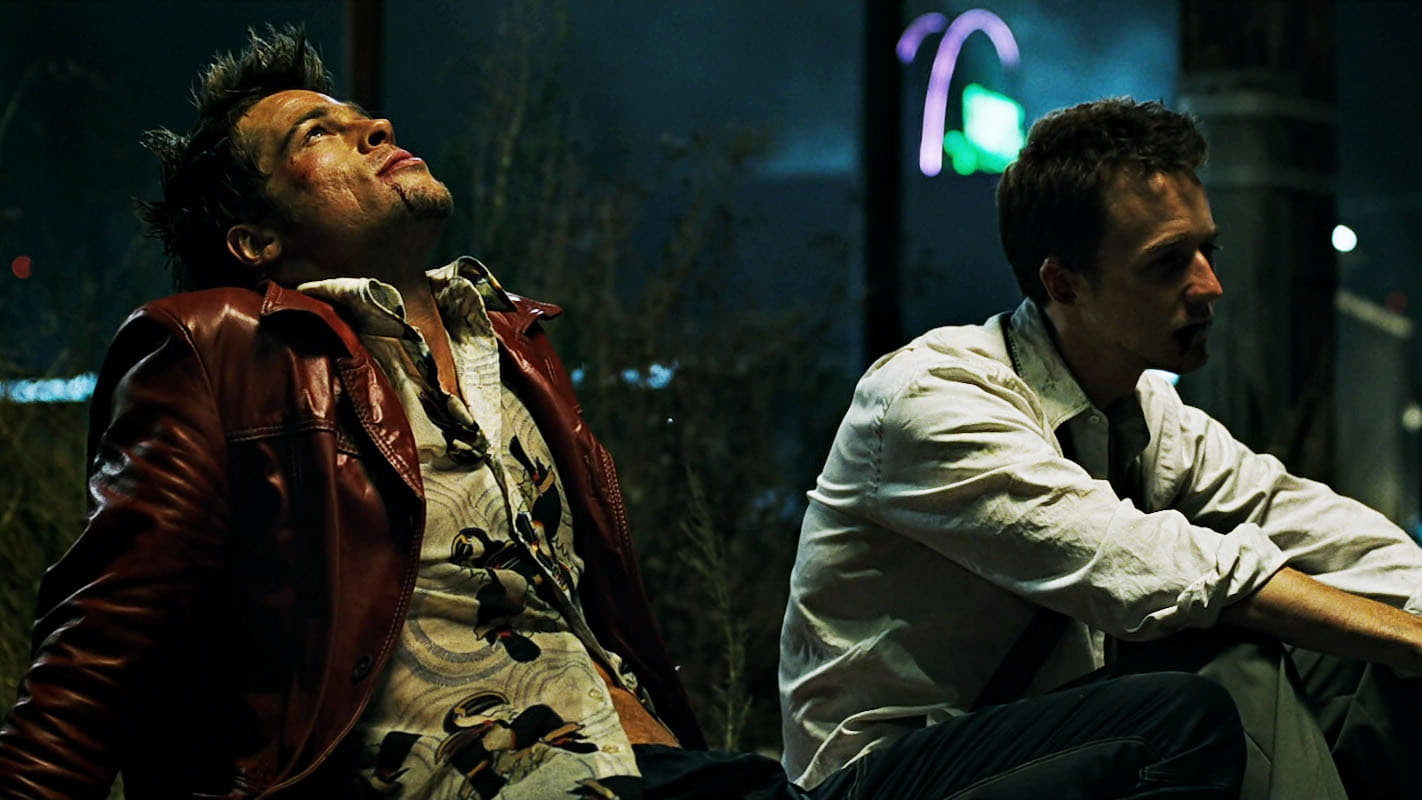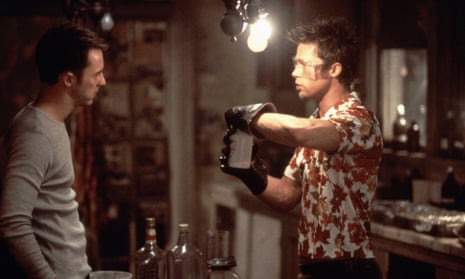Deconstructing Masculinity and Society: A Deep Dive into "Fight Club"
Introduction:
"Fight Club," directed by David Fincher and released in 1999, is a film that has left an indelible mark on popular culture. Based on Chuck Palahniuk's novel of the same name, the movie delves into themes of consumerism, masculinity, and societal disillusionment. With its gritty portrayal of underground fight clubs and its exploration of the psyche of its characters, "Fight Club" remains a thought-provoking and controversial piece of cinema. In this review, we'll dissect the film's themes, performances, and its enduring relevance.
The Duality of Narrator:
At the heart of "Fight Club" is its narrator, played brilliantly by Edward Norton. The character, known only as the Narrator, embodies the ennui and dissatisfaction of modern life. He's a white-collar worker, drowning in the monotony of his job and the emptiness of his consumerist existence. Norton's performance captures the subtle nuances of his character's descent into madness, as he becomes increasingly disillusioned with the world around him.
One of the film's most intriguing aspects is the duality of the Narrator's personality. He's both the everyman, struggling to find meaning in his life, and the embodiment of Tyler Durden's anarchic philosophy. Brad Pitt's portrayal of Tyler Durden, the Narrator's charismatic alter ego, is electrifying. Pitt injects the character with a raw energy and magnetism that is both alluring and terrifying. The dynamic between Norton and Pitt drives the film forward, as their characters navigate the murky waters of masculinity and rebellion.
Consumerism and Alienation:
"Fight Club" is a scathing critique of consumer culture and the alienation it breeds. From the opening scenes, where the Narrator describes his mundane existence, to the chaotic climax, the film exposes the hollowness of materialism. The iconic line, "The things you own end up owning you," encapsulates the film's central thesis. It's a stark reminder that our possessions often become shackles, trapping us in a cycle of desire and dissatisfaction.
The film's portrayal of consumer culture is both visceral and surreal. From the sleek, sterile interiors of office buildings to the grungy, underground fight clubs, Fincher creates a world that is at once familiar and alien. The fight club itself becomes a metaphor for the characters' longing for authenticity and connection in a world devoid of meaning. Through violence and destruction, they seek to reclaim their humanity and break free from the constraints of society.
Masculinity and Identity:
At its core, "Fight Club" is a meditation on masculinity and identity. The characters' quest for self-discovery leads them down a dark and dangerous path, where violence becomes a means of asserting dominance and reclaiming agency. The film's portrayal of masculinity is complex and often contradictory. On the one hand, Tyler Durden embodies traditional notions of masculinity – he's charismatic, aggressive, and unapologetically alpha. Yet, he's also deeply flawed, his machismo masking a profound sense of insecurity and self-loathing.
The Narrator, meanwhile, represents a more passive form of masculinity – one that is emasculated by the soul-crushing demands of modern life. His journey throughout the film is one of self-realization, as he grapples with the conflicting aspects of his personality. By embracing his darker impulses, he's able to break free from the constraints of societal expectations and forge a new identity for himself.
Themes of Anarchy and Rebellion::max_bytes(150000):strip_icc()/fight-club-2000-b85f7ccd3592499fb07d57e3d6a9f18f.jpg)
"Fight Club" is often associated with themes of anarchy and rebellion, and for good reason. The titular fight club serves as a crucible for the characters' pent-up rage and frustration, providing an outlet for their primal impulses. Yet, beneath the veneer of chaos lies a deeper message about the nature of power and control. As the fight club evolves into an underground movement known as Project Mayhem, the characters' quest for freedom becomes increasingly entangled with authoritarianism.
Through Project Mayhem, Tyler Durden seeks to dismantle the very fabric of society, rejecting the notion of consumerism and conformity in favor of chaos and destruction. Yet, in doing so, he becomes a tyrant in his own right, imposing his will on others and erasing their individuality. The film's climax, where the Narrator confronts Tyler and ultimately rejects his philosophy, serves as a powerful rebuke to the allure of nihilism and extremism. "Fight Club" is a film that defies easy categorization. It's a psychological thriller, a social commentary, and a character study all rolled into one. More than two decades after its release, its themes of consumerism, masculinity, and rebellion continue to resonate with audiences around the world. With its bold visuals, memorable performances, and thought-provoking narrative, "Fight Club" remains a landmark achievement in cinema – a film that challenges us to confront the darkness within ourselves and the world around us.
"Fight Club" is a film that defies easy categorization. It's a psychological thriller, a social commentary, and a character study all rolled into one. More than two decades after its release, its themes of consumerism, masculinity, and rebellion continue to resonate with audiences around the world. With its bold visuals, memorable performances, and thought-provoking narrative, "Fight Club" remains a landmark achievement in cinema – a film that challenges us to confront the darkness within ourselves and the world around us.
Furthermore, "Fight Club" remains relevant because it taps into the zeitgeist of its time while addressing universal themes that transcend the era of its release. Its commentary on consumerism, for instance, is perhaps even more pertinent in today's hyper-commercialized society, where social media influencers and advertising bombard individuals with messages of materialistic fulfillment. The film's depiction of disillusionment with the corporate world and the quest for authenticity strikes a chord with audiences grappling with similar existential crises in the modern era.
Moreover, the exploration of masculinity in "Fight Club" continues to spark discussions and debates. In an age where traditional notions of gender are being reexamined and redefined, the film's portrayal of male identity and societal expectations remains relevant. The characters' struggle to reconcile their inner demons with external pressures resonates with anyone navigating the complexities of gender roles and societal norms.
Additionally, "Fight Club" raises important questions about the nature of rebellion and the consequences of unchecked extremism. While the film glorifies acts of defiance against societal norms, it also serves as a cautionary tale about the dangers of ideological fanaticism. The descent of Project Mayhem into chaos and violence underscores the inherent risks of pursuing radical change without regard for the consequences. On a technical level, "Fight Club" continues to impress with its innovative filmmaking techniques and visual style. David Fincher's meticulous attention to detail and mastery of atmosphere create a world that feels simultaneously gritty and stylized. From the iconic soap-making scene to the frenetic fight sequences, the film is filled with memorable moments that linger in the mind long after the credits roll.
On a technical level, "Fight Club" continues to impress with its innovative filmmaking techniques and visual style. David Fincher's meticulous attention to detail and mastery of atmosphere create a world that feels simultaneously gritty and stylized. From the iconic soap-making scene to the frenetic fight sequences, the film is filled with memorable moments that linger in the mind long after the credits roll.
Furthermore, the performances of the cast, particularly Edward Norton and Brad Pitt, elevate the material to another level. Norton's portrayal of the tormented Narrator is nuanced and compelling, while Pitt brings a magnetic charisma to the enigmatic Tyler Durden. Their on-screen chemistry drives the narrative forward and lends emotional weight to the film's themes.
In conclusion, "Fight Club" remains a cinematic tour de force that continues to captivate audiences with its bold storytelling and provocative themes. Its exploration of consumerism, masculinity, and rebellion transcends its 1990s origins, speaking to timeless truths about the human condition. As we navigate an increasingly complex and uncertain world, the film's message of individuality, self-discovery, and the search for meaning resonates now more than ever. "Fight Club" stands as a testament to the enduring power of cinema to challenge, provoke, and inspire.


















































